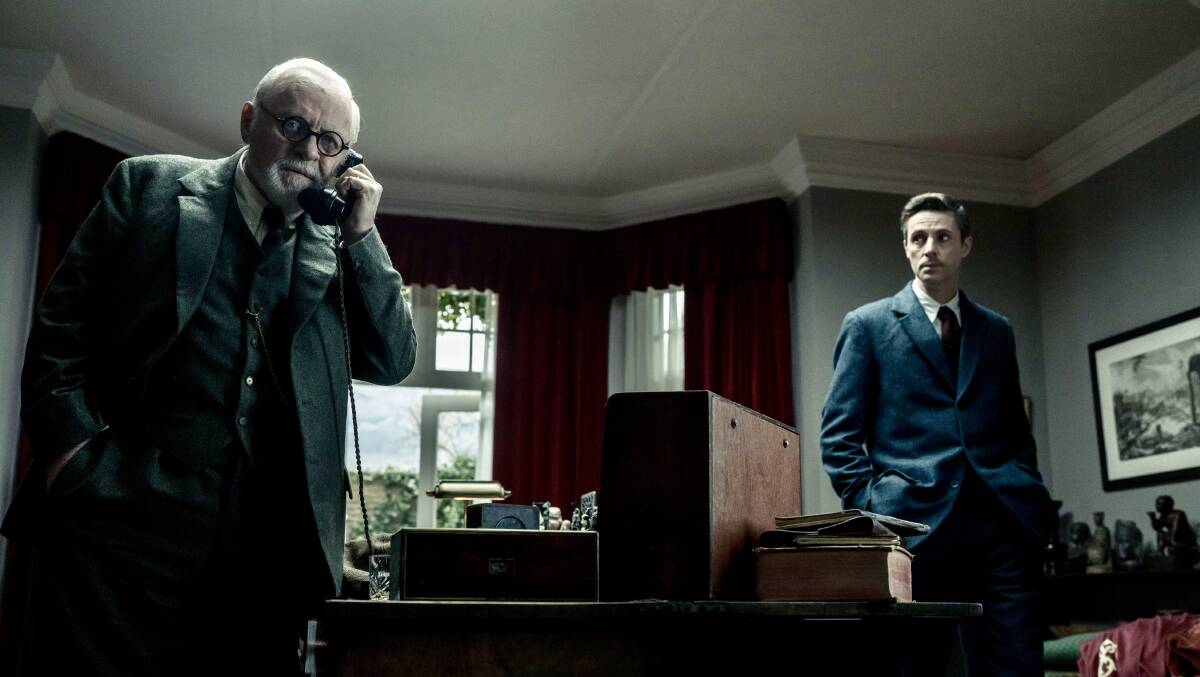Freud's Last Session. M, 109 minutes, Three stars
Several weeks before he died, Sigmund Freud met with an Oxford professor whose identity remains a mystery. As war was taking hold in Europe in 1939, it's likely this session was a lively meeting of minds, but there is no known record of the topics that were covered. Freud's Last Session hazards a guess as it introduces children's author C. S. Lewis to the founder of psychoanalysis.
Lewis, "Jack" to his friends, was 40ish and an established academic by that point. He was a friend of a fellow academic John (J. R. R.) Tolkien and member of the Inklings literary group but had not yet embarked on his extensive career in non-fiction and fiction. The Chronicles of Narnia children's books for which he is likely best remembered would not appear until the 1950s.
The book title that Freud would have known his guest by at that point was a satirical allegory of the Church, The Pilgrim's Regress, a riff on John Bunyan's classic, The Pilgrim's Progress, a tome once required reading for students of English lit. Lewis's satirical allegory had been published a few years earlier, after he returned to the fold of Christianity.
Irascible and ailing, Freud (Anthony Hopkins in his element) has a low opinion of his guest's religious worldview. He is opposed to any religion, Christianity and the rest, and he doesn't hold back. It's also irritating that Lewis (Matthew Goode) arrives late - a faux pas that Lewis can nonetheless explain away with a reference to trains crowded with children being evacuated to the safety of the countryside. Hosting children at his own home during World War II is said to have contributed to his classics like The Lion, The Witch and the Wardrobe.
Freud's Last Session, by playwright Mark St Germain and director Matt Brown, has been adapted to the screen after it made its first appearance on the stage in the US, where it had a successful off-Broadway run.
Many scenes take place in the study of Freud's Hampstead home, a space that replicated his rooms in Vienna. Walls lined with bookshelves are to be expected, but figurines of mythical gods and religious saints? It's intriguing, when all his life Freud has had no time for the concept of God in any religion. A firm adherence to science and reason provided all the truth he needed to know.
The film prods at personal contradictions that each of the men harbour, like Freud's domineering hold over his adult daughter Anna (Liv Lisa Fries from the brilliant TV series Babylon Berlin). She is a complex character, a pioneer of child psychoanalysis and coming out as gay. Lewis' odd relationship with the mother of a friend who died alongside him in the trenches of the Somme in World War I also gets some attention.
The film isn't confined to the single location of Freud's densely furnished study. The world outside intrudes with dutiful Anna's frequent calls to her father, and the occasional whine of air-raid sirens. Having to rush to a nearby church to shelter in the cellar with other neighbours is a bonding experience for Freud and Lewis. On other occasions, flashbacks take us to the trench warfare in Europe, and to Vienna before Freud and Anna fled to England. The darkly lit mise-en-scene convincingly evokes the gloom and pessimism of the times, but the low lighting eventually becomes claustrophobic, and you long for the relief of at least one sunny day.
In contrast to his arrogant and pugnacious host, Lewis is urbane, self-effacing and good humoured, even at one point turning the tables as he sits in the psychoanalyst's chair while Freud reclines on the "transformational" couch. Hopkins delivers the irascible screen persona we admire him for, with a hint of mischief, and it's as convincing as ever.

At the end of the encounter, this debate between the atheist man of science at the end of his life and the medievalist and writer of children's fantasy at mid-point in his career is not as riveting as you would imagine. While both of the lead actors are a joy to watch as their characters argue their way through their meeting, the writing is rather weak and ultimately it doesn't deliver on the enticing challenge of the remarkable "What if" scenario it has set itself.

